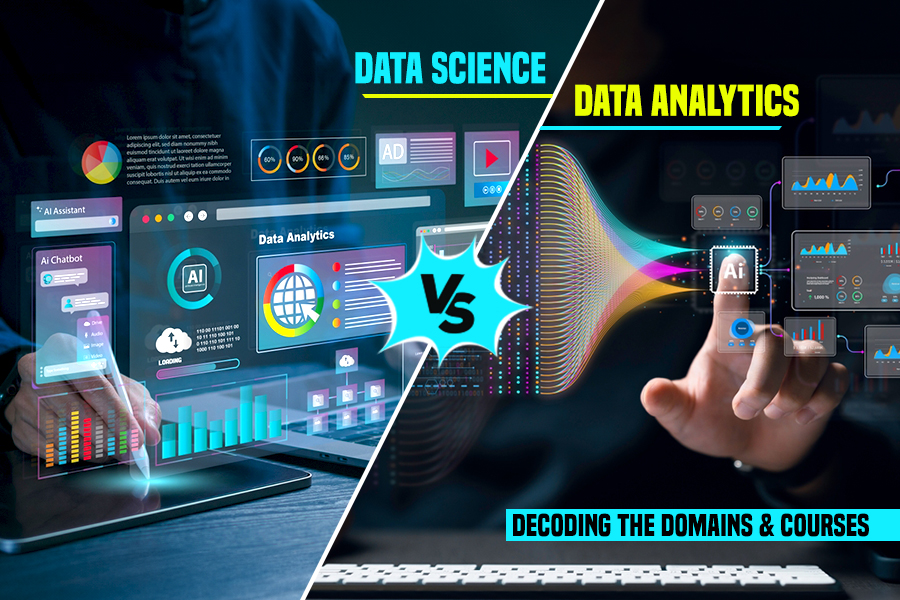
Data Science vs. Data Analytics: Decoding the Domains & Courses
The global data sphere is believed to reach up to 175 zettabytes by 2025. There will be a massive demand for relevant professionals who interpret and manage data, and the demand for data scientists and analysts is increasing rapidly in the job market.
Are you pondering how to make a great career in this field?
You must choose a data science or data analysis course to establish a successful career. Now comes the question of Data Science vs. Data Analytics, and which course is appropriate for you?
Today, businesses and industries mostly rely on data to drive decisions and create a presence in the digital world. Specifically, data science involves the extraction of meaningful insights from massive datasets with the correct algorithm and statistical models. Data analytics focuses on interpreting historical data to gain patterns and trends and help organisations in real-time.
For the aspiring professional, understanding the difference between Data Science and Data Analytics is crucial. Knowing the true meaning and potential of each will help choose the right skills and career direction. In this comprehensive read, our aim is to provide an understanding of these two major, distinct yet interconnected fields. Let’s dig into the definition, key differences, career opportunities, and more.
What is Data Science?
Data Science is the flow form of mathematics, statistics, AI, and machine learning. It is an interdisciplinary field that incorporates several disciplines to extract actionable insights from structured and unstructured data. The primary focus of this field is on discovering solutions to problems that we are not even aware of.
It includes computer science, predictive analysis, machine learning, and statistics. These involvements shift the massive datasets and establish solutions for every complex problem. Key components of data science include:
Data Science Algorithms include mathematical models and statistical techniques for analysing and interpreting data. They offer actionable insights for valuable decision-making.
- Machine Learning in Data Science: ML (Machine Learning) is considered the heart of data science. In this, algorithms learn from the data and improve performance without explicit programming.
- Big Data and Data Science: Big Data mainly refers to vast datasets that traditional data processing techniques are not able to handle. Data Science leverages Big Data tools to access patterns and actionable trends for quality outcomes.
- Artificial Intelligence and Data Science: AI integrates with data science to develop systems that match human intelligence. Additionally, the appropriate data visualisation and analysis improve predictive analytics and automation systems.
The crucial tools in data science include Python, machine learning, powerful programming language and visualisation. SQL is also used for data manipulation and querying databases.
Career opportunities and advancement have endless options.
Diverse skills in data science tools and techniques, Python for data science and relevant significantly expanding its demand. With the rising need for data-driven actionable insights, roles like data scientist and machine learning engineer are in high demand. Mastering a data science course ensures open doors to a thriving career.
What are Data Analytics?
Data analytics is the process of examining raw data to create meaningful insight and inform decision-making. Its primary focus is on various methods and analyses of datasets to gain valuable insights. It aims to answer specific questions and offer immediate solutions to complex challenges.
For every enthusiast, pursuing a data analytics course offers the required knowledge to master techniques and build a successful career. Data analysts work on creating technical methods to capture, process, and organise data and bring solutions to the issues. Unlike data science, data analytics is more into producing results that can lead to immediate improvement. Let’s discuss the core process of data analytics:
- Data Cleansing and Preparation: The core process includes ensuring data accuracy and quality by removing duplicates. It also involves handling missing values and standardising formats.
- Statistical Analysis in Data Analytics: Using techniques such as regression, hypothesis testing, and correlation analysis to access trends and patterns.
- Predictive Analytics Techniques: Utilising machine learning models is vital to forecasting future outcomes based on historical data.
Effective tools like Power BI and Excel are widely used in data analytics. These two tools are mostly used in the industry to create data manipulation, visualisation, and reporting. Excel provides a spectrum of functions and allows one to access the basic analysis process. On the other hand, Power BI enables real-time reporting and helps businesses make success-driven decisions.
Data analytics use cases in business commonly comprise customer segmentation, sales forecasting, and performance tracking. These applications are crucial because they enable businesses to optimise operations, enhance customer experiences, and stimulate growth. Make sure to learn these skills to contribute significantly to business success.
Key Differences Between Data Science vs Data Analytics
Data science and data analytics are two critical fields in the data-driven world. Both play a critical role but hold different goals, tools, applications and career paths. Let’s discuss Data Science vs Data Analytics in detail:
Goals and Focus Areas
Data science mainly focuses on building predictive models and accessing valuable insights from massive unstructured datasets. The goal is to create data science algorithms that can effectively predict or automate decision-making.
On the other hand, data analytics mainly deals with examining historical or existing data to draw meaningful insight. It is often based on thorough descriptive statistics. The aim is to make informed business decisions based on existing data.
Tools and Techniques
In terms of tools and techniques, data science professionals use advanced tools such as Python, R, Machine Learning, and deep learning frameworks. They also rely on large-scale data processing platforms such as Hadoop and Spark.
However, data analysts predominantly focus on tools like SQL and Excel and business intelligence platforms like Tableau and Power BI, which are used to visualise and interpret data.
Applications
In real-world applications, data science includes machine learning models, AI (Artificial Intelligence) systems, and predictive analytics. It is essential in sectors such as healthcare, finance, and marketing.
On the other hand, data analytics focuses on visualising data, reporting, and business intelligence. The aim is to help organisations optimise their performance and build strategies based on a thorough analysis of past trends.
Career Paths
A Data Science course equips the learners with essential skills and experience. The course aims to prepare students for responsibilities and roles such as data scientist, machine learning engineer, or AI specialist. Professionals or enthusiasts must have excellent programming and mathematics expertise to excel in this field.
Data analytics courses are ideal for those looking for or interested in roles like data analysts, business intelligence analysts, or operation analysts. They also offer endless opportunities. Data analytics is an excellent career for non-technical professionals who must leverage analytics tools without excellent technical skills.
Which is Better: Data Science or Data Analytics?
If you must choose between data science and data analytics, your choice will depend on your career interests. You can consider data science if you aim to establish a more technical, model-driven role. However, if you are not interested in technical roles and are more interested in solving problems with insights, then go for a data analytics course.
The data science and analytics courses are ideal for non-technical professionals to make bright careers. With these courses, you can hold specialists in either field based on your goals, passion, and career choice.
Career Opportunities in Data Science vs Data Analytics
Are you willing to know career perspectives in data science and data analytics?
Understanding the different paths of each, their unique offerings, and their impact on industries is important for success. Every day, the demand for data-oriented roles is expanding rapidly in different industries like technology, healthcare, finance, and e-commerce. In this digital world, companies or businesses are relying on data professionals to make data-driven decisions, ultimately to enhance their operational efficiency and drive growth.
In data science, you get a plethora of opportunities with high-paying roles. Data science job roles include Data Scientist, Machine Learning Engineer, and AI Specialist. They work on building models, algorithms, and predictive tools. Their work is based on data to predict trends and influence organisations’ direction. Rely on a Data Science course in Kolkata or another Tech-HubSpot in India to excel in the future and have a successful career.
Conversely, data analytics job roles include business analyst, data analyst, and data visualization. They focus heavily on interpreting data, identifying trends, and presenting actionable insights. Their specialisation is statistical analysis, visualisation, and reporting. To thrive in the industry, rely on the Data Analytics Course in Kolkata or other tech-hub cities.
Not only in India but also in other countries of the world, the demand for data professionals or specialists has touched the sky. It is expected that it will rise even more in the coming days.
Businesses, industries, and organisations are becoming dependent on data and require specialists at every phase. With the rise and booming tech industry, dependency on data and use in a valuable way is important. Several large companies or even startups are investing in digital transformation. There will be a continuous need for skilled and experienced data science and analytics professionals.
Although both fields require strong analytical skills, data science leans more toward programming and advanced statistical methods. At the same time, analytics focuses more on interpreting data to drive strategic decisions.
Skills Required for Data Science vs. Data Analytics
When comparing the skills of Data Science and Data Analytics, both fields have almost the same background. The significant difference lies in their approach and working procedure. Both fields demand a strong foundation in data manipulation and analysis, and this is very clear. However, certain specific skills set them apart from each other and can differ significantly.
Essential Skills for Data Science
- Core skills for data science majorly include advanced knowledge and skills in Machine Learning. This allows data scientists and relevant professionals to create predictive models most effectively.
- Python is another required skill to excel and thrive in data science. It allows professionals to manipulate large datasets and implement machine learning algorithms efficiently. Python is also considered the dominant programming language in data science. It is used to build data-cleaning models and advance computation.
- Another essential skill required in data science is data science algorithms. Understanding algorithms such as regression, clustering, and decision trees is crucial to building predictive and interactive models.
Essential Skills for Data Analytics
- In contrast, essential skills for data analytics mainly focus on data-driven decision-making. These skills play a critical role when analysts use the data to inform business strategies. Professionals offer actionable insights to bring desired success and growth.
- A strong grasp of statistical analysis is also required to excel in this field. With strong statistical analysis skills, they interpret data patterns and make interfaces. Further, they use statistical analysis to conduct hypothesis testing.
- Another essential yet practical skill required is SQL for data analytics. It is the backbone of data retrieval and is widely used for querying relational databases.
However, there are some overlapping skills for data science and analytics. Both require common data visualisation skills to showcase the data effectively. Critical thinking ability and data cleaning are essential for both to drive success. Ensuring the integrity of data is an important task for both roles. Both fields demand critical thinking to have a meaningful impact.
In summary, Data Science vs. Data Analytics fields share common foundational skills. Data science requires more advanced technical skills, and data analytics requires more data-driven strategies.
Choosing Between Data Science vs Data Analytics Courses
When selecting between data science and data analytics courses, it is essential to consider your career aspirations. Data science individuals aim to engage with machine learning, artificial intelligence (AI) and sophisticated algorithms. Getting a recognised certification is particularly beneficial if you are targeting positions such as data scientist or machine learning engineer.
Data analytics, however, is more suited for those who wish to examine trends and derive insights, leveraging tools like Excel, SQL and Tableau. For non-technical professionals, a data analytics course proves to be more approachable. Your preferred level should inform this choice of technical expertise. The specific career followed you envision within data-driven environments.
Top Data Science and Analytics Courses and Programs
If you want to stay ahead in this competitive industry, it is crucial to choose the right course. Some of the best success-oriented data science and analytics courses provide foundational skills and real-world experience.
Top Data Science Programs
A Master’s in data science is a comprehensive and top program that covers almost every essential, technical, and other area. This course is ideal for those who want to gain in-depth knowledge in this field and become successful data scientists.
Top data science programs also include certification or diploma courses. These are short-duration, cover all major topics, and provide hands-on experience. Data science training institutes in Kolkata aim to enhance your skills in data analysis and programming languages like Python and R.
Affordable Data Analytics Courses
You will find several options if you are looking for a budget-friendly course. Affordable data analytics courses in Kolkata usually help learners gain expertise in tools like Excel, Tableau, and SQL.
Many affordable options are available from recognised Institute. After completion of the course, you will also get certifications to reflect your skills in future.
Online Data Science Courses for Beginners
- Data science training institutes in Kolkata also offer online programs for those seeking flexibility and convenience. Get a Data Science Course with online training facilities to enter the world of data science.
- Online programs are often project-oriented learning approaches and follow hands-on experience.
Hands-On Data Science Training
- Hands-on training is essential for gaining practical knowledge of real-world challenges. Look for courses that offer practical projects and real-world datasets to learn and explore.
- Ultimately, this will allow students to gain experience and be highly valued by employers.
You can rely on one of the best institutes in Kolkata, like Webskitters Academy, to get proper theoretical skills and training. In a well-known institute, experts lead instructions by experts. They also offer practical experience through real-time projects.
How do you use Excel in data science or data analytics?
There are several ways to excel in data science or data analytics. Its mandatory requirement is the combination of knowledge, skills, and practical experience. Let’s discuss some significant tips to help you succeed in these fields.
- Leverage Online Courses: If you have problems with on-site training, rely on the online mode. Online courses are a great way to begin your journey. Depending on your interest, you can enrol in both data science and data analytics online courses.
- Master Key Tools: If you are willing to be a successful and proficient professional in these fields, you need to master key tools. Make sure to master Power BI and SQL. These are the foundational skills required to thrive in the future.
- Gain Practical Training and Certifications: A practical training program from a recognised institute will help you get proper training with valuable certifications. Look for courses that offer hands-on training and also provide certificates to add value to your skills.
- Strategies for Non-Technical Professionals: Even if your background is non-technical, you still need to excel at building strategies. You have to understand business issues and how to handle them. Learn basic programming language and data analysis techniques. Stay focused to stay ahead.
Following these strategies or tips will help you succeed in the data science or data analytics field.
Transform your future with data skills at Webskitters Academy
In conclusion, Data Science and Data Analytics are both exciting fields. The only difference lies in their focus and approach. Data science focuses on algorithms, Machine Learning, and predictive modelling, while data analytics involves interpreting datasets to find patterns and trends.
You can go with your interests while making your decision. Both of them serve as exciting goals with endless opportunities. You need to focus on your quality education and training program.
Webskitters Academy is one of the well-known institutes in Kolkata that offers top-notch Data Science and Data Analytics courses. Enrol now to gain practical experience and valuable certification to boost your career.
Search
I Want to Learn...
Category
Explore OurAll CoursesTransform Your Dreams
into Reality
Subscribe to Our Newsletter
"*" indicates required fields







